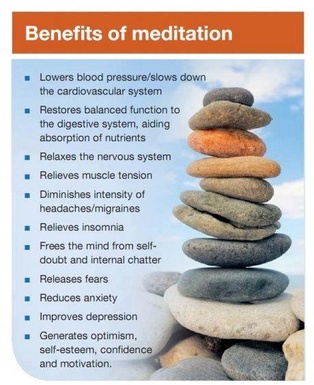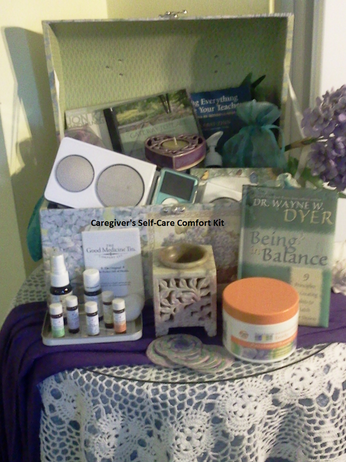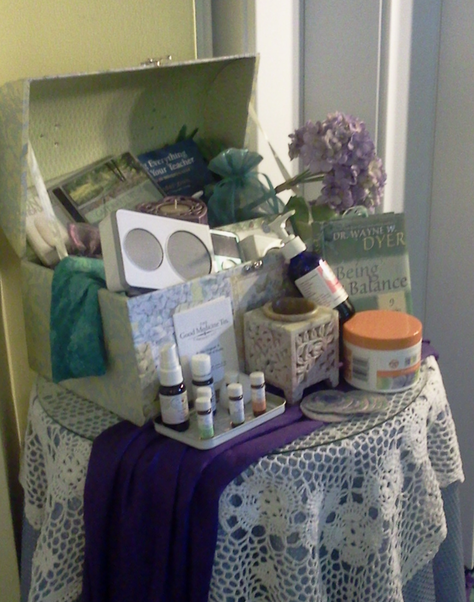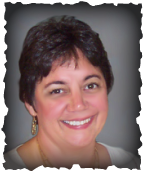|
12/12/2019 0 Comments Kirtan Kriya Meditation Update
Well, fast forward seven years from my last post on this subject. It got sort of lost in the busyness of life, but now the research and support for various types of meditation, such as mindfulness-based stress reduction and kirtan kriya have a much broader base of information to bolster the early claims.
I am creating a link to a Youtube video I found for doing this simple 12-minute (or so) meditation which involves chanting or singing four syllables: SA TA NA MA. First, you sing them aloud for 2 minutes, then you whisper them for 2 minutes, then silently say them for 4 minutes, then whisper again for 2 minutes, then aloud again for 2 minutes. The music and voice will keep you on track so you don't have to time anything. While doing the above, you sit in whatever way is comfortable for you, close your eyes and touch your index finger, middle finger, ring finger and pinky to your thumbs as you sing, whisper or silently repeat the four syllables. The image in the video demonstrates this. Now, I know this is a little bit "out there" for some of my readers, but, hey--is improving your cognition and strengthening the hippocampus of your brain to help prevent Alzheimer's worth 12 minutes a day of your time? Try it for 6 weeks and see if you notice a difference. I'd love to hear your feedback!
0 Comments
9/21/2015 Today is World Alzheimer's Day - remember those who forget and how to avoid becoming one of themI just read an article published in The Guardian, titled "One Third of People Born in 2015 Will Develop Dementia" and I felt a shiver go through me - a mix of disbelief, dread and then a goodly portion of righteous anger. I think every single human with a beating heart who looks at the statistics, those cold, easy to ignore numbers, and applies them to the babies being born now can't help but cry out that we ALL need to do more to address this health crisis. There is a virtual tsunami of dementia coming if we don't find ways to stop it. It will swamp our healthcare system and there will be no where to escape it.
Research is, of course, necessary, and finally receiving some significant attention. But we can do more than that. Those who are children or caregivers of parents/elders with dementia know personally the devastating consequences that it can bring -- emotional, financial, in family relationships, in health of the caregiver. So, that multiplies the shivers by quite an exponential factor. The truth is, there is almost NO one who is untouched by Alzheimer's in some way: whether it be a parent or grandparent, spouse, aunt or uncle, cousin or friend who is losing their personality and memory in excruciating pieces. Julianne Moore recently put a spotlight on the early-onset form of Alzheimer's in her award-winning performance in the film "Still Alice". And there are various groups vying for funds to support the cause in various ways. But I want to talk about what is within our power, each of us, as individuals, to defeat this disease. There's actually quite a lot that we CAN do, aside from shivering in disbelief. Here are some of the most important, scientifically supported ways you can reduce your own risk of developing Alzheimer's disease:
I'm going to stop here, though I could go on at length. The information is here, on this website and many others. I really implore you all to take your power back and act on that which you CAN control. Type II diabetes is at epidemic proportions, and this is something we can treat and reverse. So today, in honor of World Alzheimer's Day, won't you make a commitment to your own health and happiness by taking some steps to avoid Alzheimer's yourself? Do it for your own benefit and also for those who love and depend on you. Do it for your children to set a good, healthy example for them so they don't become one of the three people who will develop dementia. Whatever reason inspires or motivates you, just do it!  I have written often of the benefits of meditation, particularly when combined with music as a guided meditation experience. Now there is increasing evidence from mainstream medical research of what has been understood for thousands of years by wise teachers of many traditions: meditation is great for people! The truly excellent thing about meditation is that anyone can do it, pretty much anywhere. It is easy, free (or very inexpensive if you choose to buy CDs or download guided versions), is proven as effective as pharmaceutical aids in reducing depression and stress, and has no side effects other than an increased sense of well-being and peacefulness. Click here to see the research done at Johns Hopkins investigating meditation as anti-depressant. What's not to love about that? The Mayo Clinic also published a newsletter article titled "Meditation: A simple, fast way to reduce stress" which gives an great overview of the subject . Various forms of meditation have been taught, mostly in eastern cultures, and the practice has been growing by leaps and bounds in the west over the past thirty years or so. There have been a number of pioneeers in bringing the practice of mindfulness-based stress reduction (MSBR) to the west, including Jon Kabat-Zinn who founded the Stress Reduction Clinic and Center for Mindfulness in Medicine, Health Care, and Society at the University of Massachusetts Medical School. His clinic was featured on the public television series Healing and the Mind with Bill Moyers in 1993. Meditation has such incredible benefits that I believe everyone can find some help by practicing it. In my own experience as a caregiver, meditation and music, combined with fervent and frequent prayer, saved my sanity when it was hanging by a thread. I find it compelling that the list of benefits meditation offers so exactly corresponds to symptoms many (or most) caregivers experience. The only mystery to me is why more caregivers don't use this incredible tool for balance and strength. Which is why I am making it my mission to get this information out to those who need it through this website & blog, by writing, speaking, teaching, and otherwise promoting it. How often is there a perfect solution to so many of our everyday stresses just waiting for us to sit down and get quiet long enough to find its gifts? If you'd like to explore the ideas and resources for meditation, please visit my Meditation and Music page on this site and also take a look at the ideas for Self-care and Caregiver Resource Store. I will also be publishing a book which further details resources and tools for caregivers: Sanity Savers for Caregivers at the End of Their Rope. You can add your name for an announcement of publication, which is targeted for March 2014. If you would like to read a chapter from the book about the uses of music and meditation, click here. I encourage you to explore the idea of various forms of meditation and find what appeals to you personally. In my 17 years of caregiving, music and meditation were the brightest jewels in the caregiver crown. Try it out. You have nothing to lose and so very much to gain! 3/21/2013 Caregiver's Self-Care Comfort Kit"You give but little when you give of your possessions. It is when you give of yourself that you truly give." ~Kahlil Gibran  Caregiver's Self-Care Comfort Kit Caregivers are, by their very definition giving people. They do give of themselves, sometimes for many years, faithfully supporting their care-receiver. It turns out that most caregiving roles are more a marathon than a short sprint, so one has to be prepared with the strength and stamina to continue. Quite often caregivers find themselves battling their own chronic stress, burnout, depression, health problems, relationship challenges, and other negatives to quality of life. It is, therefore, of the utmost importance to find ways to reduce the stress, relax, disengage for a time of respite and renewal. I've spoken of this many times in the past year, even giving recommendations to create a Caregiver Comfort Drawer for those emergencies when you need a little extra TLC. However, in the previous posts, I didn't include a photo of the kinds of things I was recommending, and a photo is, as the saying goes, worth a thousand words. So, today, I am giving you a glimpse into my own self-care comfort kit, a photo tour, and a list of the types of things I included that worked for me. I realized, especially toward the end of my mother's life, that this comfort kit needed to be mobile, rather than in a drawer at home. That way, my visits to Mom could include pampering for us both. I hope you will find the suggestions helpful and that some of them will resonate with you. Please do find something to help you deal with the stress levels. It is not being self-indulgent to do so -- it may save your sanity, and perhaps even your very life! Here is a list of items my comfort kit contains, by category: Aromatherapy: Oil Lady Aromatherapy Good Medicine Tin, which includes 5 essential oils, pure organic jojoba to blend them, a lavender mist bottle, and instructions on how to use them in various ways, such as in a diffuser, in the shower/bath, in self-massage, hand massage, etc. These are simply wonderful in all kinds of situations, to calm & balance oneself and reduce stress. I give them my highest recommendation. They also sell a Sweet Sleep Kit with the lavender mist, and lavender oil, along with natural tranquilizer oil, which is great for those nights when sleep eludes you or your care-receiver. I also have a diffuser in my kit. Mine uses tea light candles, so must be attended at all times, but there are electric ones as well which can be set to low temperatures. In addition to the above, I also included Stimulator Oil and Balancer Oil blends from Oil Lady. I love them for myself and my Mom. Aura Cacia makes two great body creams that have become favorites -- Lavender and Patchouli/Orange are now my standards for moisturizing and make a pleasant bedtime ritual. And, I use some of their bath products when I want a special, relaxing treat. For more aromatherapy suggestions, visit my page: Aromatherapy Books & Music: For relaxation, I use a guided meditation called Gateway to Peace by Max Highstein. It is soothing music and words which takes you on a 12 minute journey of renewal. Great stress reducer! I also use Jon Kabat-Zinn's CD, Mindfulness for Beginners to learn mindfulness meditation. And, as a companion to that, the book Everything is Your Teacher, based on Kabat-Zinn's book, Full Catastrophe Living, offers great insights. I love Wayne Dyer's book Being in Balance which is quite helpful, and can be read in small increments if time is in short supply. There are many other books and recordings, and I find it most functional to put the music and meditations on an iPod for easy use and storage of a bunch of favorites. I bought an iHome speaker dock for it, which is rechargeable and has its own case for easy portability. That way, others, such as your care-receiver, can listen to, if you wish. I cannot emphasize to you enough the amazing power that music has to affect your mood and sense of well-being. It is a wonderful tool, for both you and your loved one, so please do make use of it in the ways you find most healing and helpful. Other items: A small journal/Gratitude journal Stationary and envelopes Colored pens, pencils, sketch pad Healthy snacks and not-so-healthy emergency chocolate (dark, of course, so I don't feel quite so guilty) You can get very creative with your comfort kit -- after all it is for YOU, so whatever speaks to your heart and soothes your soul is perfectly valid. I also advise using humor wherever possible and in whatever form you can find. It really will help keep life on the lighter side to have some laughter) 7/26/2012 Elders and Loneliness: SolutionsOne of the most recurrent themes in eldercare is the highly detrimental effects of boredom & loneliness. This is something experienced by most elders, whether living alone or in an assisted living or nursing home situation. It can even be a problem for elders living with family, depending on the family dynamics. For family caregivers, this translates into a very difficult issue, creating conflict and emotional upheaval, and, of course, guilt, if their loved one is afflicted by loneliness. Yet there are some bright spots on the horizon. One pioneer in innovative long term care reform is physician William H. Thomas. He is a self-described "nursing home abolitionist" and has been an advocate for eldercare reform for decades, creating the Green House Project nursing home concept, the Eden Alternative philosophy and training to "deinstituionalize" eldercare facilities by alleviating the "three plagues" of boredom, helplessness and loneliness. The Eden Alternative, which incorporates pets, gardens and children into the culture of nursing home care has an international following and is actively revolutionizing elder care. In addition, this Harvard-trained physician has written numerous books, one of which he turned into a one-man play which he performed to raise further funds for his visionary goals. He is a passionate speaker who champions honoring and valuing elders and aging with dignity, love & joy. He is truly an inspirational, enthusiastic powerhouse of a man! Click here view a video of Dr. Thomas and catch a bit of his spirit and commitment. And here's another recent video with Dr. Thomas visiting a woman in a nursing home and bringing such joy and delight to her with some beloved opera played through headphones for her. OK, hanky-alert on this one. I melted into tears because she reminded me so much of my own mother. Dr. Thomas and his wife have also developed and built an entire village in Shelburne, NY centered around these concepts, called ElderShire: Creating Well-Being through Living in Community. The need for this kind of revolution is most apparent to anyone who has experienced the soul-less bleakness that is prevalent in the current culture of nursing homes as "storage" for the elderly. Dr. Thomas' lifework offers hope and vision, along with well-designed and researched programs and materials for creating healthier, happier aging in our world. Given the graying of our populations (in particular the baby boomer generation in the US) these are ideas whose time has come and we must implement these changes now to create a better life for both elders and the ones who care for them! If you should need further evidence of the importance of banishing the "three plagues" of nursing homes, the article which appeared in Science Daily this week supplies it -- titled: Mindfulness Meditation Reduces Loneliness in Older Adults, Study Shows. The study offers verifiable data that the meditation known as mindfulness-based stress reduction (MBSR) reduced both loneliness and also markers in the blood for inflamation response, which are indicated in a host of physcial and neurological diseases, including heart disease, stroke, and Alzheimer's. Won't you join me in supporting this vision and important culture shift in whatever way is possible? I cannot imagine a more worthy goal than to turn our reality of aging (and let's face it -- no one has found the fountain of youth!) into one of health and well-being and joy! |
About Karen
Karen is a compassionate, enthusiastic student of life, who cared for her mother for 17 years. She brings her insights, compassion, experience and desire to share knowledge and healing to this ongoing conversation with others on the caregiving path. If you are caring for a parent, spouse, friend or other loved one this site offers sanity-saving tips, open-hearted self-care ideas, and an open forum for discussion, connection and sharing resources for the journey. Archives
October 2021
CategoriesAll Acceptance Aging Together Alan Cohen Alive Inside Movie Alzheimer's Alzheimer's Prevention A Mind Of Your Own Anxiety Aromatherapy Audio Therapy For PTSD Austin Air Hepa Filter Autism Back Care Video Beginner's Mind Being Present Blessing For Caregivers Books Brain Insulin Butterfly Story Calm Calm.com App Care For Veterans Caregiver Advocate Caregiver Coalition Caregiver Comfort Kit Caregiver Guilt Caregiver Retreat Caregiver's Serenity Prayer Caregiver Stress Caregiver Support Care Giving Caregiving Vulnerability Care In Hospital Caterpillar Into Butterflies Chamomile Tea Cindy Laverty Comedian Computers & Exercise Crisis Dan Cohen Deepak Chopra Delirium Depression Diabetes Disaster Preparedness Distractions Dr. Dharma Singh Khalsa Dr. Oliver Sacks Eden Alternative Eldershire Elizabeth Dole Foundation Emergency Planning Emergency Preparation Emerson End Of Caregiving Enough Already Escapism Essential Oils Food Safety Forgiveness Funny Stories Gaiam.com Gail Sheehy Gift Of Alzheimer Gift Of Healing Presence GMO Food Green House Project Gregory Fricchione Md Grief Guilt Happy Light Healing Holding Hands Home As Sanctuary Hope Hospital Caregiving Hospital Stay Humor Inspirational Reading Ipods For Nursing Homes Isolation Jacksonville James E. Miller John Denver Johns Hopkins Study John T. McFadden Jon Kabat-Zinn Kelly Brogan Kirtan Kriya Meditation Lao Tzu Laugh Laughter Lavender Loneliness Loss Of Purpose Love Love In The Nursing Home Maya Angelou Mayo Clinic Mayo Clinic Alzheimer's Blog MD Meditation Meditation Garden Melatonin Memory Memory Cafe Military Caregiver Mindfulness Meditation Mr. Bean Music Music & Alzheimer Music And Memory Neurological Research Noise Pollution Operation Family Caregiver Opportunity Overnight Respite Care Pandemic Passages In Caregiving Patience Paul Coelho Peace Post-traumatic Stress Disorder Power Of Love Prayer PTSD Quality Of Sleep Radical Contentment Relaxation Releasing Problems Renewal Research Respite Rewind Rodney Yee Rosalynn Carter Rosalynn Carter Institute For Caregiving Rowan Atkinson Sanctuary Sanity Self Care Serenity Silence Sleep Slowing Time Solutions Soothing Music Stress Stress Relief Sun Sunshine Support For Caregivers Tai Chi Thanksgiving The Care Company The Kiss Time Traumatic Brain Injury Travel With Alzheimer's Person Treat VA Caregivers Valentine's Day Verilux Veteran Farms Veterans Veteran Suicide Vitamin D Wayne W. Dyer Wellness Wendell Berry White Noise William H. Thomas Worry Yoga Yoga Video |


